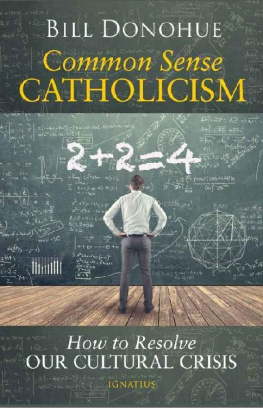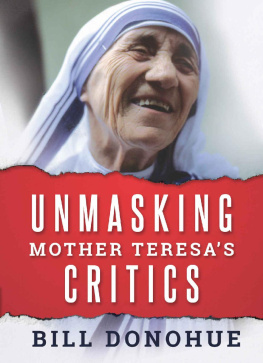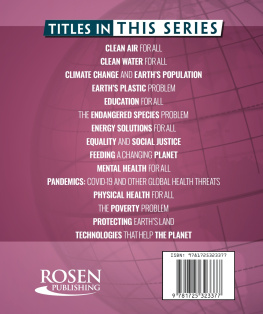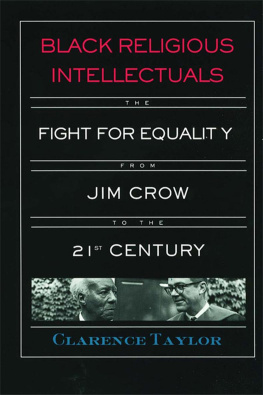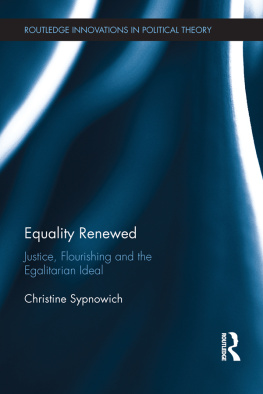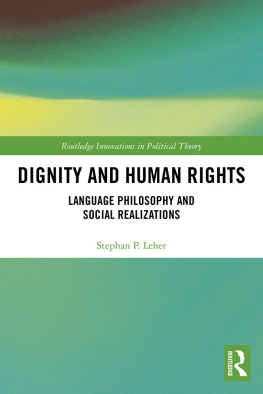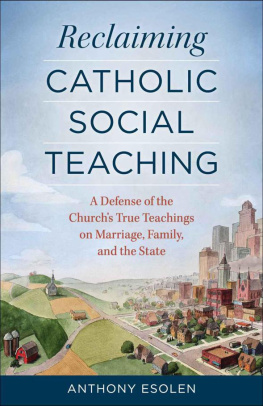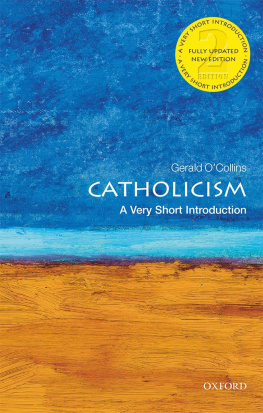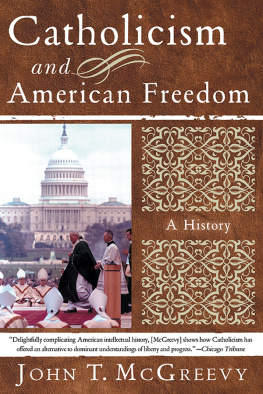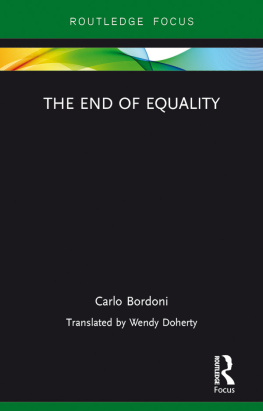COMMON SENSE CATHOLICISM
For my grandson, Grant William
BILL DONOHUE
Common Sense
Catholicism
How to Resolve Our Cultural Crisis
IGNATIUS PRESS SAN FRANCISCO
Unless otherwise indicated, Scripture quotations are from the Revised Standard Version of the BibleSecond Catholic Edition (Ignatius Edition) 2006 by the National Council of the Churches of Christ in the United States of America. Used by permission. All rights reserved worldwide.
Excerpts from the English translation of the Catechism of the Catholic Church , Second Edition, 1994, 1997, 2000 by Libreria Editrice VaticanaUnited States Catholic Conference, Washington, D.C. All rights reserved.
Unless otherwise indicated, quotes from papal documents are from the Vatican website, http://w2.vatican.va, by Libreria Editrice Vaticana.
Cover image from allvision/us.fotolia.com
Cover design by Carl Olson
2019 by Ignatius Press, San Francisco
All rights reserved
ISBN 978-1-62164-209-1 (PB)
ISBN 978-1-64229-066-0 (EB)
Library of Congress Control Number 2018948283
Printed in the United States of America
CONTENTS
INTRODUCTION
Stupidity and the Collapse
of Common Sense
Survey after survey shows that most Americans believe we are going in the wrong direction. They are asking lots of questions. Why does everything seem to be out of whack? Whats happening to our society? Why have right and wrong switched places? Why is incivility so commonplace? Why are standards dropping in school and in the workplace? Whatever happened to decency? Why do so many people see religion as the enemy? Why is respect for authority and tradition vanishing? We seem to be coming apart at the seams.
It wasnt always this way, and it doesnt have to be this way. Getting back on track, however, requires that we figure out what happened and why, and then apply the right remedies.
To understand what ails us, we need to put aside the notion that our problems are fundamentally political and economic in nature. They are not. American society is in trouble largely because our social and cultural house is broken. The social fabric is coming apart, and our culture is in a state of decline.
There are many reasons why we are on the wrong track, but there is one factor that is of overriding importance: we have adopted policies, norms, and values that are at odds with some very fundamental truths governing human nature. Its as though everything we have learned about the human condition throughout history has been totally discarded, if not trampled on, so bizarre is our predicament. To say this lacks common sense is an understatement. In fact, the collapse of common sense is driving our derailment.
Fortunately, we are not without answers to what ails us. They are found in the wisdom of Catholic social thought, teachings that respect the limits of the human condition and that are grounded in common sense.
The first thing we need to realize is that bad things are not always the result of bad peoplestupid people, yes, but not necessarily bad people. By stupid, I do not mean badly educated. Indeed, most of our problems are the direct consequence of highly educated persons, many of whom are intellectuals. But how can they be educated yet stupid?
Going to school and reading a lot of books are to be commended, but they are no guard against stupidity. Indeed, from my years spent as a college professor, I can testify that some of the stupidest people I have ever met teach college. It is not as though they are incompetent in their field of studymost are well trainedits just that many of them can barely function. To put it differently, they have a hard time navigating in the real world. Thats why they like the classroom: its safe.
Stupidity is not a lack of knowledge. For example, if someone doesnt know how to hard-boil an egg, he is not stupid: he simply hasnt learned how to do it. Stupidity is many things, but, most of all, it is a lack of common sense, as in sound judgment. Unfortunately, there are many ideological strains of thought that are not grounded in common sense. Fortunately, the teachings of the Catholic Church are a rich source of accumulated wisdom, which can help us acquire prudence.
Thomas Jefferson knew the difference between a practical man and a bookworm. State a moral case to a ploughman and a professor. The former will decide it as well [as] and often better than the latter, because he has not been led astray by artificial rules.
Jefferson, Orwell, Buckley, and Chesterton were getting at the same subject: the stupidity of many intellectuals. Of course, we can all act foolishly, so why did Jefferson pan the professors? Why did Orwell single out intellectuals? Why did Buckley want to be governed by ordinary men, and not the Harvard faculty? Why did Chesterton speak about their lunacies? These four learned men were anything but anti-intellectual, so what did they see in these people that made them wince? The absence of common sense explains it all.
Merriam-Webster defines common sense as sound and prudent judgment based on a simple perception of the situation or facts. Notice that the definition says nothing about education. Thats one reason why it is entirely possible to be well educated yet not possess common sense. This is especially true of intellectualsthey are more likely to lack common sense . To put it another way, they are more likely to lack practical experience, and, as a result, their judgment about mundane conditions is often flawed. We are all born ignorant, said Benjamin Franklin, but one must work hard to remain stupid. Many intellectuals work very hard at it.
It cannot be emphasized too strongly that the criticisms about intellectuals made in this book do not apply to all of them; they are meant to apply to blue-sky thinkers and hard-core ideologues. Such intellectuals are likely to work in a college or a university, and they are clearly overrepresented in the humanities and the social sciences, although they can also be found in the theoretical and applied sciences. Driven more by emotion than by reason, they are not interested in the pursuit of truth. Intellectuals who are worthy of our respect do not share those characteristics; they have their feet on the ground and are persuaded by logic, reason, and empirical evidence. It is unfortunate that we do not have more of them.
Bruce G. Charlton is a professor with common sense. The British scholar teaches at the University of Buckingham and wrote a splendid piece for Medical Hypotheses , Clever SilliesWhy the High IQ Lack Common Sense. In it, he notes that it has often been observed that high IQ types are lacking in common senseand especially when it comes to dealing with other human beings. His research led him to conclude that the most intelligent people have personalities which over-use abstract analysis in the social domain, and this implies that the most intelligent people are predisposed to have silly ideas and to behave maladaptively when it comes to solving social problems.
Charlton is being too kind: the brainy ones he describes are not only unable to solve social problemsthey are responsible for creating them. Indeed, he seems to recognize this himself when he writes that the fatal flaw of modern ruling elites lies in their lack of common senseespecially the misinterpretations of human psychology and socio-political affairs. He ventures to say that this lack of common sense is intrinsic and incorrigible.
Charlton is on to something. The highly educated tend to overanalyze events, employing abstract ideas to think about human behavior. It can be said that they are capable of solving the worlds most daunting problems, so long as they never leave the classroom. Too many do, however, and that is where the danger lies. Worse, those in the business of disseminating ideas, which is what intellectuals do, ineluctably shape the thinking of decision makers in all segments of society. The trickle-down effect is not only real; it demonstrates the power of these savants.

